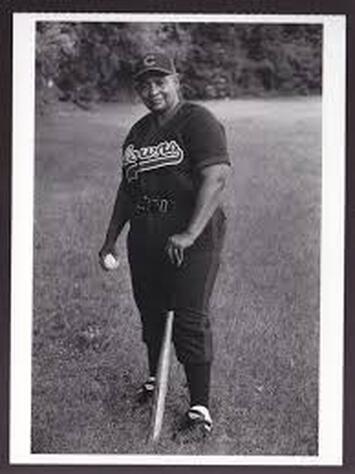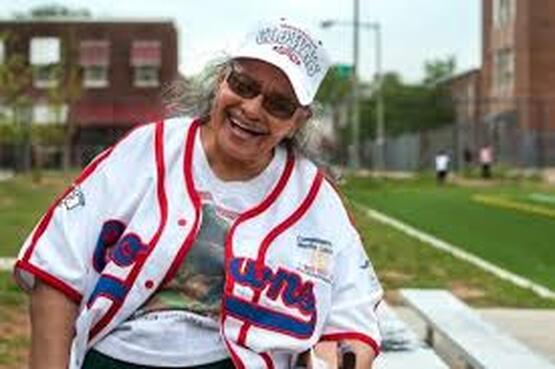|
On September 27th, 1935, Mamie Belton was born in Ridgeway, South Carolina to parents Della Belton Havelow and Gentry Harrison. Her parents separated when she was a child, she lived with her paternal grandmother while her mother worked in Washington D.C., during this time her love for baseball developed by playing with her Uncle Leo “Bones” Belton; Bones was close in age to Mamie and they both improved their baseball skills together. They created their own bats, balls, and bases out of the materials they were able to find. Throwing rocks at crows regularly helped her develop a strong pitching arm. Her primary schooling was in a two-room building called the Thorntree School, before moving to New Jersey to live with members of her family, following the death of her grandmother. Mamie’s grandmother was one of the first people who supported her baseball ambitions. Confident in her abilities, Maimie honed her baseball skills playing against boys before she decided to become a part of an organized team. Living in New Jersey allowed Mamie to play baseball as much as she wanted; she even had her choice of playing with women or men. She attempted to play for an all-girls team, but it is reported that she quit in frustration because she was not used to playing softball; she learned to play baseball by playing with boys so the game of softball was not thrilling to her. She would later join an all-white boy’s baseball team where she quickly became one of the best players, she helped to lead the team to two championships behind her strong right arm and crafty pitching. Around 1947, Mamie moved to Washington D.C. to live with her mother and began studying to become a dietician at the Freedman’s Hospital, which is now Howard University Hospital. Even though she was pursuing her academics, she never gave up on her dreams of playing baseball. She joined two semi-professional baseball teams, the Alexandria All-Stars and St. Cyprian's, in hopes of creating a baseball career for herself. Her next step was to try out for the All-American Girls Professional Baseball League but was not allowed to play. She was angry and determined to show the world that she was a great baseball player. Mamie met and married a man named Charles Johnson. The couple produced a son before they eventually divorced. By 1953, the Negro Leagues were in decline due to the Major League Baseball luring the best of the black baseball players to their league. This was not good overall for the league, but it opened a door for Mamie to shake up the world. During this time Mamie was playing baseball part-time and working at an ice cream shop, she was spotted by a scout named Bish Tyson who worked for the Indianapolis Clowns, which was a Negro League team. Tyson was able to introduce Mamie to Buster Haywood and McKinley 'Bunny' Downs, both managers of the Clowns. This meeting led to Mamie gaining a tryout for the Clowns and eventually making the team, joining two other women who were already a part of the team, Toni Stone and Connie Morgan. She became a starting pitcher for the Clowns from 1953 to 1955; she won her first start as a pitcher and went on to post an overall record of thirty-three wins and eight losses. As a member of the Clowns, Mamie traveled to Tennessee, Arkansas, Georgia, Alabama, Kentucky, Missouri, and many other states, showing off her special talents as a pitcher. Along with her stellar record as a pitcher, Mamie posted a batting average of around .284. With Jim Crow being the law of the land, as the Clowns traveled to various states to play their games, the male players would sleep on the team’s bus while Mamie and the other women players slept at houses of local black families for safety. Mamie was aware of the racial tension in America and how it stifled black baseball players, but she was still determined to play and determined to show the world that black male and female baseball players were as good as, or even better than their white counterparts. Mamie earned the nickname “Peanut” from a Kansas City Monarch player named Hank Bayliss, he would constantly tell her that she was small and looked like a peanut pitching on the mound. Though Mamie was successful playing baseball in the Negro Leagues she began to set herself up for life after sports by studying nursing on the side. As a member of the Indianapolis Clowns, she made no more than $700.00 a month in a league that was on its last leg. She had an exciting an enlightening encounter with baseball legend Satchell Page, who gave her some tips on how to throw her curve ball better. By 1955, the Negro Leagues was struggling to stay afloat and Mamie had her son to raise; she did not make enough money playing baseball to properly sustain herself and her son. Mamie Johnson left baseball in 1955 as one of the Negro Leagues most successful pitchers and the only woman to pitch in the Negro Leagues. After leaving baseball Mamie earned a degree in nursing from North Carolina Agricultural & Technical State University and sustained a nursing career for thirty years. Though she was not actively playing baseball, she still had a love for the game which she used to coach teams in youth baseball leagues; she also worked for her son at his baseball memorabilia shop in Maryland. Though Mamie Johnson’s name is not mentioned when people speak of the baseball greats, she was honored by Bill Clinton during his presidency, earned the Mary McLeod Bethune Continuing the Legacy Award, a book titled "A Strong Right Arm" was written about her life and, a one-woman show about her life titled "Change Up" was performed in various theaters. She was honored in two-thousand five by the Washington Nationals and the mayor of Washington D.C. Anthony Williams, in the inaugural game for the Washington Nationals. Mamie Johnson died in 2017 as an unsung baseball pioneer. Her contributions to baseball may not be talked about much, but she is just as significant as any male baseball legend, black or white. She helped kick the doors wide open for women who wanted to play professional baseball. Her intelligence, skills, heart, and love for the game helped her become the legend that she is. Mrs. Mamie "Peanut" Johnson, we proudly stand on your shoulders. J.A. Ward Click here to learn more about the On the Shoulders of Giants book series!!! References:
http://www.visionaryproject.org/johnsonmamie/ https://aaregistry.org/story/mamie-peanut-johnson-a-strong-right-arm/ https://scafricanamerican.com/honorees/mamie-peanut-johnson/ https://en.wikipedia.org/wiki/Mamie_Johnson
0 Comments
|
Details
Categories
All
Click Here to join our mailing list
|
Contact Us: |
Connect With Us |
Site powered by PIT Web Design



 RSS Feed
RSS Feed



